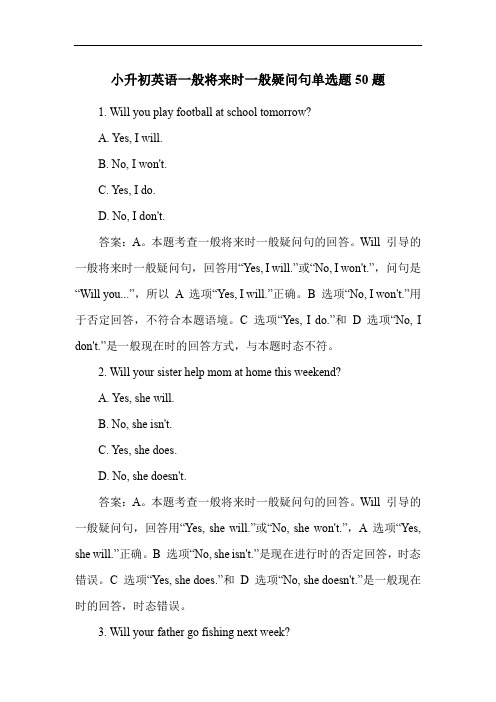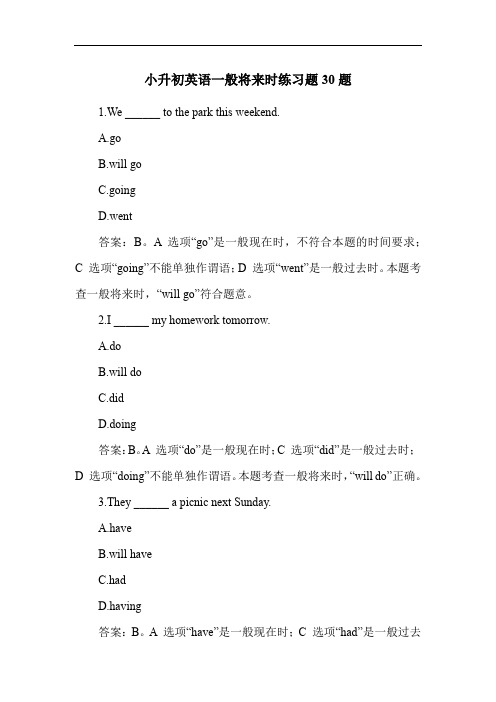小升初英语一般将来时-
小升初英语一般将来时单选题40题

小升初英语一般将来时单选题40题1. We ______ a party next week.A. will haveB. are going to haveC. haveD. had答案:B。
本题考查一般将来时的用法。
“next week”表示将来的时间,一般将来时的结构有“will + 动词原形”和“be going to + 动词原形”。
选项A“will have”和选项B“are going to have”都可以表示将来,但“be going to”表示计划、打算做某事,有一定的计划性,根据语境“我们下周打算举办派对”,有计划的意味,所以用“are going to have”更合适。
选项C“have”是一般现在时,选项D“had”是一般过去时,均不符合。
2. They ______ to Beijing tomorrow.A. will goB. are goingC. goD. went答案:A。
此题考查一般将来时。
“tomorrow”表明是将来的动作。
“will + 动词原形”表示单纯的将来,“be going + 地点”表示打算去某地,此处是去北京这个动作,用“will go”更恰当。
选项B“are going”后缺少“to”,选项C“go”是一般现在时,选项D“went”是一般过去时,均不符合。
3. My sister ______ a new dress this weekend.A. will buyB. is going to buyC. buysD. bought答案:B。
“this weekend”提示用一般将来时。
“will + 动词原形”和“be going to + 动词原形”都能表达将来,“be going to”更强调根据现有迹象和打算做某事,这里根据语境姐姐有买新裙子的打算,所以用“is going to buy”。
选项C“buys”是一般现在时,选项D“bought”是一般过去时,均不符合。
小升初英语一般将来时一般疑问句单选题50题

小升初英语一般将来时一般疑问句单选题50题1. Will you play football at school tomorrow?A. Yes, I will.B. No, I won't.C. Yes, I do.D. No, I don't.答案:A。
本题考查一般将来时一般疑问句的回答。
Will 引导的一般将来时一般疑问句,回答用“Yes, I will.”或“No, I won't.”,问句是“Will you...”,所以A 选项“Yes, I will.”正确。
B 选项“No, I won't.”用于否定回答,不符合本题语境。
C 选项“Yes, I do.”和 D 选项“No, I don't.”是一般现在时的回答方式,与本题时态不符。
2. Will your sister help mom at home this weekend?A. Yes, she will.B. No, she isn't.C. Yes, she does.D. No, she doesn't.答案:A。
本题考查一般将来时一般疑问句的回答。
Will 引导的一般疑问句,回答用“Yes, she will.”或“No, she won't.”,A 选项“Yes, she will.”正确。
B 选项“No, she isn't.”是现在进行时的否定回答,时态错误。
C 选项“Yes, she does.”和D 选项“No, she doesn't.”是一般现在时的回答,时态错误。
3. Will your father go fishing next week?A. Yes, he will.B. No, he isn't.C. Yes, he does.D. No, he doesn't.答案:A。
本题考查一般将来时一般疑问句的回答。
小升初英语一般将来时练习题30题

小升初英语一般将来时练习题30题1.We ______ to the park this weekend.A.goB.will goC.goingD.went答案:B。
A 选项“go”是一般现在时,不符合本题的时间要求;C 选项“going”不能单独作谓语;D 选项“went”是一般过去时。
本题考查一般将来时,“will go”符合题意。
2.I ______ my homework tomorrow.A.doB.will doC.didD.doing答案:B。
A 选项“do”是一般现在时;C 选项“did”是一般过去时;D 选项“doing”不能单独作谓语。
本题考查一般将来时,“will do”正确。
3.They ______ a picnic next Sunday.A.haveB.will haveC.hadD.having答案:B。
A 选项“have”是一般现在时;C 选项“had”是一般过去时;D 选项“having”不能单独作谓语。
本题考查一般将来时,“will have”是正确答案。
4.My parents and I ______ visit my grandparents.A.willB.will beC.beD.are答案:A。
B 选项“will be”后面要接动词的现在分词或形容词等,不能直接接动词原形“visit”;C 选项“be”不能单独作谓语;D 选项“are”是一般现在时。
本题考查一般将来时,“will”后接动词原形“visit”正确。
5.She ______ swimming in the sea this summer vacation.A.goB.will goC.goesD.going答案:B。
A 选项“go”是一般现在时;C 选项“goes”是一般现在时的第三人称单数形式;D 选项“going”不能单独作谓语。
本题考查一般将来时,“will go”符合要求。
(完整)小升初英语一般将来时

一般将来时1、定义:一般将来时表示将来某个时间要发生的动作或存在的状态2、结构:主语+will\shall\be going to+v(动词原形)+其他例如:It is going to rain. 要下雨了。
We are going to have a meeting today. 今天我们准备开一个会。
Tomorrow will be Sunday. 明天就是星期天。
The rain will stop soon. 雨很快就要停了。
I shall not go. 我不准备去了。
What shall we do for summer holiday?暑假我们做什么呢?注意:a.will用于所有人称,shall用于第一人称(we.I)b. will 常简略为'll,并与主语连写在一起,如:I'll,he'll,it'll,we'll,you'll,they'll。
c. 一般疑问句如用will you…?其简略答语须是Yes,I will 或No,I won't;3、时间标志:常常和表示将来的时间状语连用。
如:tomorrow(明天),next week(下周),from now no(从现在开始),in the future(将来),soon, in 2015, in two days(两天之后)等。
四种句式:1. be going to +动词原形1.肯定句主语+be(am /,is,/ are) going to +动词原形+其它My sister is going to learn English n ext year. 我姐姐准备明年学英语。
2.否定句主语+be(am / is / are)not going to +动词原形+其它I am not going to(go to)the cinema tonight. 我今天晚上不打算去看电影。
小升初英语一般将来时be going to与will用法单选题40题

小升初英语一般将来时be going to与will用法单选题40题1. I ______ play football tomorrow.A. am going toB. willC. amD. was答案:A。
本题考查一般将来时的用法。
“be going to”表示计划、打算做某事,通常有某种迹象表明要发生某事;“will”表示单纯的将来,没有事先计划。
根据题意,“我明天打算踢足球”,有计划的意味,所以用“am going to”,B 选项“will”没有体现出计划,C 选项“am”时态不对,D 选项“was”是过去式,不符合明天的语境。
2. They ______ have a picnic this weekend.A. am going toB. willC. are going toD. were答案:C。
“they”是复数,be 动词用“are”,A 选项“am going to”用于第一人称I,B 选项“will”没有体现出计划,D 选项“were”是过去式,不符合本周末的语境。
所以选C,“are going to”表示他们本周末打算去野餐。
3. My sister ______ visit her friend next week.A. is going toB. willC. was going toD. is答案:A。
“next week”表明是将来的时间,“my sister”是第三人称单数,用“is going to”,B 选项“will”没有体现出计划,C 选项“was going to”是过去将来时,不符合,D 选项“is”时态不对。
所以选A,意思是我姐姐下周打算拜访她的朋友。
4. We ______ see a film tonight.A. are going toB. willC. wereD. are答案:B。
“tonight”今晚,A 选项“are going to”表示有计划,此处没有强调计划,用“will”更合适,C 选项“were”是过去式,D 选项“are”时态不对。
小升初英语一般将来时 will 和 shall 区别单选题40题

小升初英语一般将来时will 和shall 区别单选题40题1.I ____ play football tomorrow.A.willB.shallC.canD.may答案:A。
本题中,“tomorrow”表明是将来的时间,“will”和“shall”都可以表示将来,但在一般情况下,“will”用于所有人称,而“shall”通常只用于第一人称(I 和we),且用于比较正式的场合或提出建议。
这里是一般的陈述句,用“will”更合适。
“can”表示能力,“may”表示可能,不符合题意。
2.We ____ go to the park this weekend.A.willB.shallC.mustD.should答案:A。
“this weekend”是将来的时间,“will”和“shall”都可表将来,对于“We”,“will”更常用。
“must”表示必须,“should”表示应该,与将来时间不对应。
3.My brother ____ visit me next month.A.willB.shallC.wouldD.should答案:A。
“next month”是将来时间,“will”用于所有人称表将来,“shall”一般不用于第三人称。
“would”是“will”的过去式,“should”表示应该,不符合语境。
4.I ____ help you with your homework after school.A.willB.shallC.mustD.can答案:A。
“after school”是将来的时间,“will”表将来,“shall”不用于此语境。
“must”必须,“can”能,不符合帮助做作业的语境。
5.She ____ come to the party if she has time.A.willB.shallC.mustD.should答案:A。
“if she has time”表明是将来的情况,“will”表将来,“shall”不用于第三人称。
2020年小升初英语总复习第4章—动词和时态4:一般将来时
Monday? —Yes, they are. /No, they aren’t.
(4) 特殊疑问句:特殊疑问词+be+主语+going to+动词原形(+其他)?
2. 单项填空。
row.
A. do
B. is going
C. is going to
( B )(2)Sarah and Tom ____ the bookstore tonight.
A. are going B. are going to C. is going to
如:I’m going to visit the Great Wall with my
parents. → What are you going to do? 【注】be going to 结构中的be动词要随人称的变
化而变化,该结构一般用于表示主语主观上计划或安 排将要去做的事情。
2. will结构 (1)肯定句:主语+will+动词原形+其他. 如:I will play the ball tomorrow.
( A )(3)My mother ____ shopping next weekend.
A. is going to go B. is going C. has going to
( C )(4)Tomorrow is January 1st,we ____ a holiday.
A. have
B. is having
答案:1. Sarah is going to/will clean her room this
小升初英语一般将来时肯定句单选题50题答案解析版
小升初英语一般将来时肯定句单选题50题答案解析版1.She ____ visit her grandparents this weekend.A.willB.is going toC.won'tD.isn't going to答案:A 或B。
本题考查一般将来时的两种基本结构。
选项A“will”加动词原形表示将来;选项B“be going to”也表示将来,因为是周末去看望祖父母,这是计划好的事情,所以用“is going to”也可以;选项C 和D 表示否定,不符合题意。
2.We ____ have a picnic tomorrow if the weather is fine.A.willB.is going toC.won'tD.isn't going to答案:A 或B。
如果天气好我们明天去野餐,这是一种对未来的假设和计划,用“will”或“be going to”均可;选项C 和D 表示否定,不符合题意。
3.Mike ____ play football after school.A.willB.is going toC.won'tD.isn't going to答案:A 或B。
迈克放学后去踢足球,是对未来的计划,用“will”或“be going to”均可;选项C 和D 表示否定,不符合题意。
4.My mother ____ cook dinner tonight.A.willB.is going toC.won'tD.isn't going to答案:A 或B。
妈妈今晚做晚饭,是计划好的事情,用“is going to”更合适,但“will”也可以;选项C 和D 表示否定,不符合题意。
5.They ____ go to the park on Sunday.A.willB.is going toC.won'tD.isn't going to答案:A 或B。
小升初英语一般将来时 be to do 表示计划安排用法单选题40题
小升初英语一般将来时be to do 表示计划安排用法单选题40题1.I am to visit my grandparents this weekend.A.go toB.going toC.will go toD.want to答案:I am to visit my grandparents this weekend.意思是“我这个周末打算去看望我的祖父母”。
be to do 表示计划、安排要做某事。
A 选项go to 一般不单独放在be 动词后;B 选项going to 通常前面有be 动词再加going to do sth.表示打算做某事;C 选项will go to 和be to do 用法不同;D 选项want to 表示想要做某事,和计划安排的意思不同。
2.She is to go shopping tomorrow.A.goes shoppingB.will go shoppingC.is going shoppingD.likes to go shopping答案:She is to go shopping tomorrow.表示“她明天打算去购物”。
be to do 表示计划安排。
A 选项goes shopping 是一般现在时;B 选项will go shopping 和be to do 用法不同;C 选项is going shopping 虽然也表示打算做某事,但和be to do 的用法不同;D 选项likes togo shopping 表示喜欢去购物,不是计划安排。
3.We are to have a picnic next Sunday.A.will have a picnicB.are having a picnicC.have a picnicD.want to have a picnic答案:We are to have a picnic next Sunday.意为“我们下个星期天打算去野餐”。
小升初英语语法句型转换-一般将来时(全国通用版)
am going to go
will go
1.I am tired. I __________
(go) to bed early
tonight.
2.Mary’s birthday is next Monday. Her brother
_____________(give)
her a present.
(2)否定句:
主语+ be + not going to +动词原形+其他.
如:
I am not going to plant trees this weekend. 这个周
末我不打算去种树。
They aren’t going to climb mountains this week.
这周他们不打算去爬山。
下周你们要去做什么?
—We will have a picnic in the park.
我们将去公园野餐。
一般将来时的用法
1. 时间标志词:
1⃣️tomorrow系列
2⃣️next系列
3⃣️in the future
4⃣️in+一段时间 等表示将来的时间状语。
如:
We will go to Shanghai next week.
week.(改否定)
won’t
go
Shirley ____ ____ to visit her grandma next
week.(改否定)
练习
We will hold a meeting this evening.(改一般疑
问句)
you
Will
____ ____ hold a meeting this evening?
- 1、下载文档前请自行甄别文档内容的完整性,平台不提供额外的编辑、内容补充、找答案等附加服务。
- 2、"仅部分预览"的文档,不可在线预览部分如存在完整性等问题,可反馈申请退款(可完整预览的文档不适用该条件!)。
- 3、如文档侵犯您的权益,请联系客服反馈,我们会尽快为您处理(人工客服工作时间:9:00-18:30)。
一般将来时1、定义:一般将来时表示将来某个时间要发生的动作或存在的状态2、结构:主语+will\shall\be going to+v(动词原形+其他例如:It is going to rain. 要下雨了。
We are going to have a meeting today. 今天我们准备开一个会。
Tomorrow will be Sunday. 明天就是星期天。
The rain will stop soon. 雨很快就要停了。
I shall not go. 我不准备去了。
What shall we do for summer holiday?暑假我们做什么呢?注意:a.will用于所有人称,shall用于第一人称(we.Ib. will 常简略为'll,并与主语连写在一起,如:I'll,he'll, it'll,we'll,you'll,they'll。
c. 一般疑问句如用will you…?其简略答语须是Yes,I will 或No,I won't;3、时间标志:常常和表示将来的时间状语连用。
如:tomorrow(明天,next week(下周, from now no(从现在开始,in the future(将来,soon, in 2015, in two days(两天之后等。
四种句式:1. be going to +动词原形1.肯定句主语+be(am /,is,/ are going to +动词原形+其它My sister is going to learn English n ext year. 我姐姐准备明年学英语。
2.否定句主语+be(am / is / arenot going to +动词原形+其它I am not going to(go tothe cinema tonight. 我今天晚上不打算去看电影。
3.一般疑问句Be (am / is / are+主语+going to+动词原型+其它?Is your father going to play basketball with you ?No , he isn’t。
你父亲打算和你去打篮球吗?不。
4.特殊疑问句特殊疑问词(Wh-+一般疑问句?Where are you going to spend Spring Fesital.? 春节你打算在哪过?2.will /shall +动词原形(在书面语中,主语是第一人称I,We时,常用shall1.肯定句主语+will/shall+动词原形+其它I (shall write to him next week. 下周我将给他写信。
2.否定句主语+ will /shall+ not + 动词原形+其它They won’t watch TV this evening。
今天晚上他们不看电视。
3.一般疑问句will/shall+主语+动词原形+其它Will you stay at home with us tomorrow ?明天你和我们呆在家里好吗?4.特殊疑问句特殊疑问词(Wh- +一般疑问句When will your father be back? 你爸爸什么时侯回来?注意:be或will提到句首,some改为any,and改为or,第一二人称互换。
课堂练习:一、填空1.我打算明天和朋友去野炊。
I_____ _______ _________ have a picnic with my friends.I ________ have a picnic with my friends.2.下个星期一你打算去干嘛?我想去打篮球。
What ________ ________ _________ _________ _________ next Monday?I _______ ______ _____ play basketball。
What _________ you do next Monday?I ________ play basketball.3.你妈妈这个周末去购物吗?是,她要去买一些水果。
_____ your mother _______ ________ go shopping this___________?Yes,she _________. She ______ __________________ buy some fruit.4.你们打算什么时候见面。
What time _______ you _________ __________ meet?二、改句子。
5.Nancy is going to go camping.(改否定Nancy ________ going to go camping.6.I‘ll go and join them.(改否定I _______ go ______ join them.7.I’m going to get up at 6:30 tomorrow.(改一般疑问句________ _______ ________ to get up at 6:30 tomorrow?8.We will meet at the bus stop at 10:30.(改一般疑问句_______ ________ meet at the bus stop at 10:30 ?9.She is going to listen to music after school.(对划线部分提问________ _______ she ________ ________ _________ after school?10.My father and mother are going to see a play the day after tomorrow.(同上_________ _________ going to see a play the day after tomorrow.三、用所给词的适当形式填空。
11.Today is a sunny day. We ___________________ (have a picnic this afternoon.12.My brother _______________ (goto Shanghai next week.13.Tom often ______________(goto school on foot. But today is rain。
He______________ (goto school by bike.14.What do you usually do at weekends?I usually ________ (watchTV and________(catchinsects?15.It‘s Friday today。
What _____she _________ (dothis weekend?She______________ (watchTV and _____________ (catchinsects.16.What ___________ (d0you do last Sunday?I____________ (pickapples on a farm.What ______________ (donext Sunday?I ______________ (milkcows.17.Mary ____________ (visither grandparents tomorrow.18.Liu Tao ____________ (flykites in the playground yesterday.19.David ______________ (givea puppet show next Monday.20.I ________________ (planfor my study now.作业:一、单项选择。
( 1. There __________ a meeting tomorrow afternoon.A. will be going toB. will going to beC. is going to beD. will go to be( 2. Charlie ________ here next month.A. isn’t workingB. doesn’t workingC. isn’t goi ng to workingD. won’t work( 3. He ________ very busy this week, he ________ free next week. A. will be; isB. is; isC. will be; will beD. is; will be( 4. There ________ a dolphin show in the zoo tomorrow evening.A. wasB. is going to haveC. will haveD. is going to be( 5. –________ you ________ free tomorrow?– No. I ________ free the day after tomorrow.A. Are; going to; willB. Are; going to be; willC. Are; going to; will beD. Are; going to be; will be( 6. Mother ________ me a nice present on my next birthday.A. will givesB. will giveC.gives D. give( 7. – Shall I buy a cup of tea for you?–________. (不,不要。
A. No, you won’t.B. No, you aren’t.C. No, please don’t.D. No, please.( 8. – Where is the morning paper?– I ________ it for you at once.A. getB. am gettingC. toget D. will get二、动词填空。
1. I ______(leavein a minute. I ______(finishall my work beforeI ______ (leave.2. —How long _____ you _____(studyin our country?—I _____(planto be here for about one more year.—I _____(hopeto visit the other parts of your country. —What ______ you ______(doafter you ______(leavehere?—I ______(returnhome and ______(geta job.3. I ______(betired. I ______(goto bed early tonight.4. Mary’s birthday is next Monday, her mother _____(giveher a present.三、句型转换。
